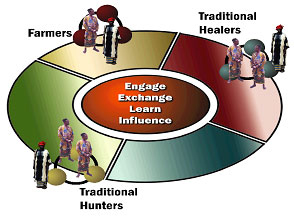
Indigenous people have a broad knowledge of how to live sustainably
Introduction
Sophisticated knowledge of the natural world is not confined to science. Human societies all across the globe have developed rich sets of experiences and explanations relating to the environments they live in. These ‘other knowledge systems’ are today often referred to as traditional ecological knowledge or indigenous or local knowledge. They encompass the sophisticated arrays of information, understandings and interpretations that guide human societies around the globe in their innumerable interactions with the natural milieu: in agriculture and animal husbandry; hunting, fishing and gathering; struggles against disease and injury; naming and explanation of natural phenomena; and strategies to cope with fluctuating environments.
Indigenous knowledge is the local knowledge that is unique to a culture or society. Other names for it include: ‘local knowledge’, ‘folk knowledge’, ‘people’s knowledge’, ‘traditional wisdom’ or ‘traditional science’. This knowledge is passed from generation to generation, usually by word of mouth and cultural rituals, and has been the basis for agriculture, food preparation, health care, education, conservation and the wide range of other activities that sustain societies in many parts of the world.
Indigenous people have a broad knowledge of how to live sustainably. However, formal education systems have disrupted the practical everyday life aspects of indigenous knowledge and ways of learning, replacing them with abstract knowledge and academic ways of learning. Today, there is a grave risk that much indigenous knowledge is being lost and, along with it, valuable knowledge about ways of living sustainably.
This module illustrates ways that indigenous knowledge may be integrated into education and thereby, bring the benefits of helping to ‘sustain’ indigenous knowledge and societies to all. It also encourages teachers and students to gain enhanced respect for local culture, its wisdom and its ethics, and provides ways of teaching and learning locally relevant knowledge and skills.
Objectives
Activities
Internet Sites
Indigenous knowledge and practices vary greatly between countries and regions. Therefore, the activities and resources provided here need to be considered within the context of indigenous experiences in your part of the world.
Useful sources of information include:
Center for World Indigenous Studies
Alaska Native Knowledge Network – Indigenous Education Worldwide
Materials, contacts, links and other resources related to the:
World Bank Indigenous Knowledge Programme
Traditional Knowledge in Sustainable Development and Resource Management
The LINKS project integrates local and indigenous knowledge (L/IK), practice and worldviews into sustainable development and resource management processes, such that rural communities become active partners in defining development targets, priorities and means. It focuses on the needs of traditional knowledge holders, both men and women, including both elders and youth.
UNESCO’s (MOST) database of best practice on Indigenous Knowledge
The Centre for International Research and Advisory Networks (CIRAN) in co-operation with UNESCO’s Management of Social Transformations Programme (MOST) jointly coordinate a database of best practice on Indigenous Knowledge. This site includes a definition of indigenous knowledge, a discussion of criteria for selecting ‘best practice’, and a registry of best practice that gives numerous detailed summaries of projects in Africa, Asia, Europe and Latin America that have sought to improve conditions and alleviate poverty through the successful employment of indigenous knowledges. The site also links to CIRAN and MOST’s joint publication entitled Best Practices on Indigenous Knowledge.